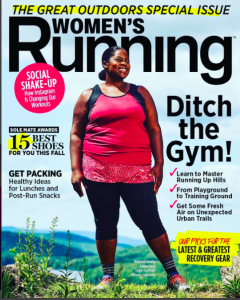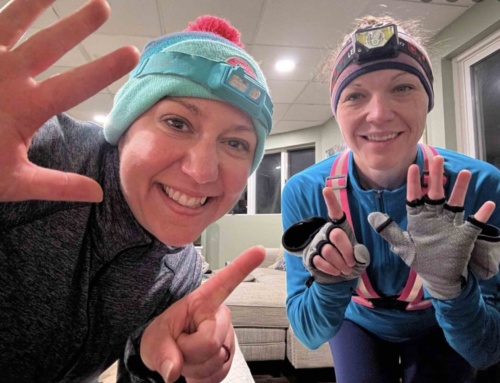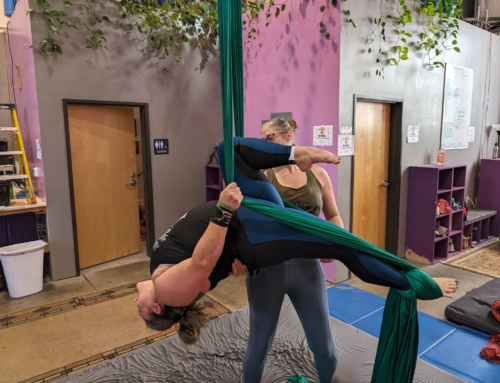
It’s no secret that we at Another Mother Runner love ourselves some Mirna Valerio. We’re talked about Fat Girl Running, obstacle races, and singing opera on epic trail runs. Mirna’s book, A Beautiful Work in Progress, has been out since the beginning of September and we finally had the chance to catch up with her about some of the topics she wrote about.
(And if you’re interested in winning your own copy of Mirna’s Beautiful Work, we have two to give away. Scroll down for details about entering the random drawing.)
The first question is an easy one: how has the book been received?
“I’ve been astounded at the reaction of people that have been reading; it’s been amazingly positive and encouraging. It’s been really cool to have people reaching out and writing me these long emails about how my book has affected them in some way or how it has motivated them to start a fitness routine again.
And now for the more difficult questions…
As a runner of color and one who is plus-size, you stand out on the trail. How do we help the running community grow more inclusive and diverse?
With the big road races and events, they are more diverse. But in terms of the trail running community, I think representation matters the most. There’s a small cadre of folks who do trail races and we see each other all of the time because there are so few of us — but it is a growing community. It’s growing quite slowly but it’s still growing.
People who are running the events are aware of the fact that “hey, this is a potential area for improvement.” There was a race director who recently reached out to me and asked “how can we do this? How can I be more invitational? How can I get more people of color to come to my races? Because I really do want it to be truly inclusive.” I think that awareness is a huge step, then some action needs to be taken.
There are some organizations – Outdoor Afro, Latino Outdoors, Black Girls Run, Black Men Run — whose primary purpose is to get people of color out into spaces where they normally wouldn’t feel like they were entitled to be or they just didn’t feel like they belonged. The fact that I was on the cover of a magazine is not lost on me. That was not lost on other people. They were like, “Finally. Somebody who looks like me.”
And not just necessarily in terms of race but in terms of body type, too. I would love to see more differently abled bodies on the covers of magazines or just being covered in general, without the stigma of difference. Let’s not go the route of “you’re such an inspiration.” That’s tired and old. People just want to be out there, be represented and, see themselves. Because seeing is believing.
You write about the expectations put on women to always be on-duty for their partners and kids – and how that contributed to you winding up in the ER thinking you were having a heart attack. Why do you think we feel compelled to do it all?
It’s engrained in us. It’s a social norm that we take on literally everything, because we’re expected to that is the way our society is designed. For example, if you look at the workplace, it is not designed for men to take off months or even years after the births of children. Our society, in America anyway, does not accommodate the family. For a lot of us, it’s more economically feasible to take on everything and for your male partner to go out and work. In that, a lot of us lose because we’re expected to do so much we lose the sense of who we are and what we’re good at, because we’re only taking care of children or we’re only taking care of our family.
Even if we do work outside the home, we still have all of those responsibilities. I’m thinking of my mother’s generation and generations before them, where the women did everything, even though they had full time jobs. They didn’t have time to go out and go do a run. Or if they did, it would see like they were being selfish. You should be using that time to take care of your children or your family or your house.
One of my husband’s friends drove my husband and I home from the hospital after we’d had our son. He asked, “What do you do again?” I said, “I’m a teacher.” He said, “That’s good because you’ll get to stay home with the kids during the summer.” I said “What? I love my son but it is not only purpose in life to take care of the house and the home and make sure that everybody is fed and clothed.”
I really try to fight against that in my life, even though that was the reason that I fell ill. I didn’t even realize I was so busy because I was thinking, “I’m working. I’m doing really, really well at my job. I also am the primary caretaker, even though my husband is here.” For everything, I was like: it’s just easier if I do it myself.
I didn’t even have time to step out of myself and look at what my life had become. It’s really hard when you are consumed with everybody else’s well-being to even think about your own well-being. It takes practice. It takes people pointing out to you. It takes a shift in our paradigm of who women are, what we do, what we can do, and what we don’t need to do anymore.
Mirna will be signing copies of A Beautiful Work in Progress on Saturday, November 4 at the New York City Marathon Expo. To win your own copy, in the comments below (and by November 8), tell us the title of the last book you enjoyed.








Rising Strong by Brene Brow
The Graveyard Book by Neil Gaiman
I just finished reading AWOL on the Appliachian Trail, by David Millar. It’s a story of a 41 year-old man who quit his job and left his wife and three young daughters at home to hike the Applicachian Trail for 5 months (or so). It was truly engrossing, as is Mirna Valerio. I love her energy and spirit. Can’t wait to hear the podcast!
Better Than Before by Gretchen Rubin
Class Mom by Laurie Gelman .. What a great book to curl up with at the start of the school year!
Cruuently reading Eleanor Oliphant is Completely Fine and LOVING it!!!
Troublemakers by Carla Shalaby
Reading “A BIG LUNCH” by Jim Harrison. I ran trails/ultras in the early 80s. Our group included people of all colors and ethnicities. I ran with a gay woman and a transgender (man to woman). All shapes and sizes. We never ever questioned who, what, why. We just all enjoyed running and hanging out and covering long distances together.
So quitting one’s job and leaving one’s wife/kids for months to run trails is a good thing?
In the middle of reading Good to Great
The last book I enjoyed was The Running Dream by Wendelin Van Draanen.
How Bad Do You Want It, by Matt Fitzgerald
LOVED this interview, and LOVE Mirna!!
Love you, Mirna!!!!! Also, the last book I enjoyed was “Middlemarch” – and I thought of Sarah Bowen-Shea the whole time hahahah!
Broken Harbor, a Dublin Murder Squad book by Tana French. Great character development, so much more than just a murder mystery.
A Life Without Limits by Chrissie Wellington. Into the running books recently!
Harry Potter and the Prisoner of Azkaban (working my way through my son’s Harry Potter series)
The Heirs by Susan Rieger – on the recommendation of the AMR book podcast!
Unlimited Power
Eleanor Oliphant Is Completely Fine was my recent favorite, and Walter Isaacson’s Leonardo Da Vinci is excellent so far.
The Lovely Bones by Alice Sebold. Heard about it on the podcast! Great book!
I’ll admit I get a bit excited when I see diversity at a race! (race, body type, age, etc) It upsets me that someone (anyone) feels that a run isn’t a place they are welcome. And I say this as a person who still internally cringes when I tell someone that I am a runner.
The most recent book that I have really enjoyed was:
HENRY: A Polish Swimmer’s True Story of Friendship from Auschwitz to America
It was more about surviving WWII and less about swimming (to my dismay……I like swimming) but a thoroughly good education and portrait of an amazing person1
Whistling Past the Graveyard by Susan Crandall
Just finished Wonder, wanted to finish it before the movie so my son and I can go see it together and compare the book with the movie
“Mrs. Fletcher” after hearing about it on an AMR podcast. I loved it!
The Hearts of Men by Nickolas Butler
Leading Change by John Kotter
I just finished The Princess Diarist by Carrie Fisher.
The Glass Castle by Jeanette Walls
Eleanor Oliphant is completely fine, per the summer book review podcast
The Girl with Seven Names. It is a riveting true story of a girl defecting from North Korea. It gave me an insight into the people and culture of North Korea.
Of mess and moxie by jen hatmaker
Uncommon Type by Tom Hanks – just finished it tonight!
Loved this interview!
I just finished a fun little book called “Glitter and Glue” by Kelly Corrigan.
Endurance “Shackleton’s Incredible Voyage “ by Alfred Lansing. Amazing story about EH Shackleton’s transcontinental Antarctica adventure. I thought the book was about running… I love Myrna being a runner that doesn’t fit the mold. You go girl!
A Man Called Ove-Fredrik Backman
Daring Greatly, by Brene Brown